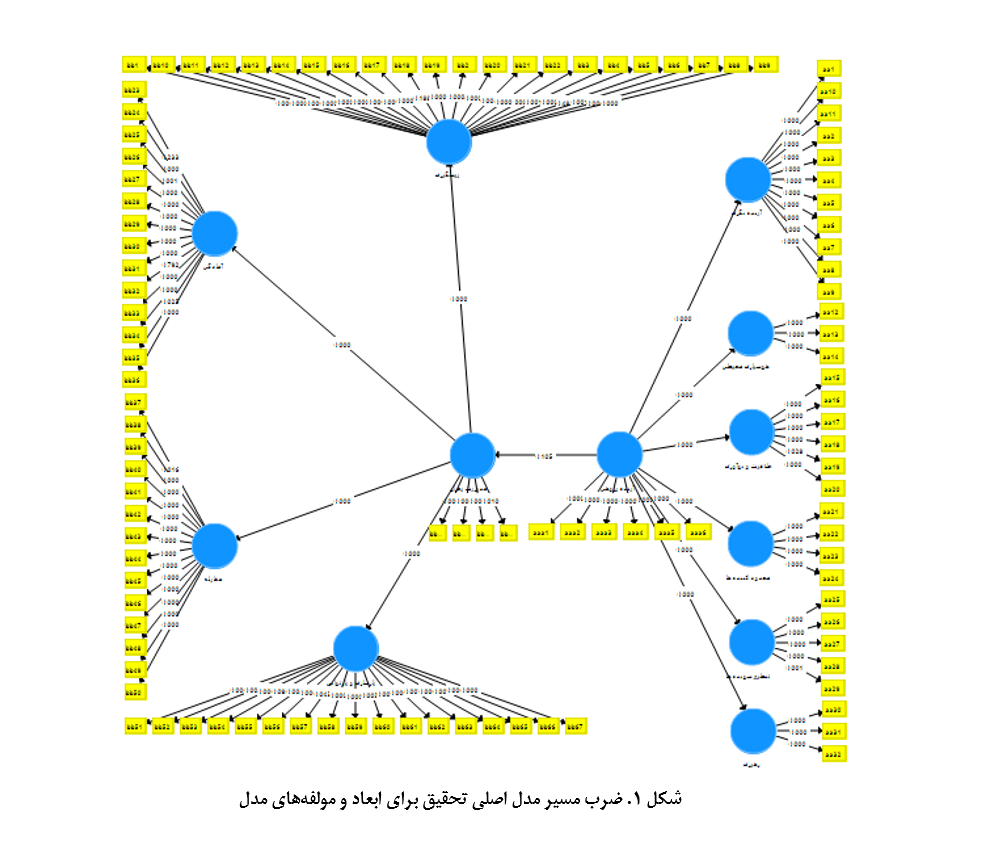Identifying the Dimensions and Components of the Institutionalization Model of Futures Studies in the Education System with a Focus on Crisis Management (Case Study: Mashhad County Education System)
Keywords:
Futures Studies, Crisis Management, Education System, Mashhad CountyAbstract
Futures studies aim to predict and enhance development and improvement in probable and possible futures by utilizing the analysis of the current situation, identifying mechanisms of change, and defining various scenarios. Crisis management plays a significant role in controlling situations and confronting crises in education. Therefore, this study was conducted to design a futures studies model with a focus on crisis management in the education system. The research method was mixed-methods (qualitative-quantitative) with an emphasis on structural equation modeling. The statistical population in the qualitative phase consisted of 29 experts and specialists selected through purposive (snowball) sampling. In the quantitative phase, the population included all employees of the Mashhad education system (15,000 individuals), from whom a sample of 450 was selected using Cochran’s formula and proportional stratified sampling. The research instrument was a researcher-developed questionnaire with a Cronbach’s alpha coefficient of 0.996. The face and content validity of the questionnaire were confirmed by experts. Data analysis was conducted using SPSS and PLS software. Among the dimensions of futures studies, the leadership, creativity and innovation, and environmental awareness dimensions were found to be of greater importance and ranked higher than other dimensions (coefficients: 0.617, 0.660, 0.735, respectively). Among the crisis management dimensions, the response and prevention dimensions (coefficients: 0.753, 0.570) had the highest impact in the education system model. The proposed model demonstrated a good fit, and ultimately, the establishment of a futures studies desk focusing on crisis management is recommended. This initiative aims to determine strategies across all domains and stakeholders by leveraging all local, national, regional, and international capacities for a desirable future in education.
Downloads
References
D'Auria A, De Chiara A, Mauro S, Borrata G. Innovative Self-Management of Knowledge to Thrive Through Crisis:
The Employees' Perspective. Journal of the Knowledge Economy. 2024:1-24. doi: 10.1007/s13132-023-01719-6.
Kazemi SH, Ahmadi E, Mortazavi M. Obstacles and Opportunities for Effective Implementation: A Case Study of
COVID-19 Crisis Policy in Kurdistan Province. dpmk. 2024;13(4):528-45. doi: 10.32598/DMKP.13.4.774.1.
Sharma GD, Kraus S, Liguori E, Bamel UK, Chopra R. Entrepreneurial challenges of COVID-19: Re-thinking
entrepreneurship after the crisis. Journal of Small Business Management. 2024;62(2):824-46. doi:
1080/00472778.2022.2089676.
Basouli M, Jabari G. The Relationship Between Crisis Management and Community Resilience in Tourist
Destinations During the COVID-19 Crisis (Case Study: Hamadan City). 2021.
Durugbo CM, Al-Balushi Z. Supply Chain Management in Times of Crisis: A Systematic Review. Management
Review Quarterly. 2023;73:1179-235. doi: 10.1007/s11301-022-00272-x.
Adams D, Lee KCS, Thien LM, Yusoff NNM. Leading Schools Through the COVID-19 Crisis in a South-East Asian
Country. Management in Education. 2021;38(2):72-8. doi: 10.1177/08920206211037738.
Ahmadi M, editor The Necessity of Innovative Businesses: With a Focus on Crisis Management and Enhancing
Market Competitiveness. International Conference on Management and Accounting; 2016; Tehran: Nikan Higher Education
Institute.
Ray Biswas R, Ray Biswas T, Rahman A. Benchmarking the Effects of Water Demand Management during Water
Crisis in a Regional City. Environmental Management. 2023;72:1277-92. doi: 10.1007/s00267-023-01862-5.
Salehi Khariz Sangi I, Rashidi MM. Knowledge Management and Its Impact on Crisis Mitigation with an Emphasis
on the Agility of Human Resources. Crisis Management Studies. 2023;15(3):131-50.
Rezapour MS, Zamani Y, Esmaeili Beigi HA, Mahani M. Investigating and Comparing the Quality of Educational
Services and Teaching Quality in Educational Centers (Case Study: Islamic Azad University, Payame Noor University, and
Scientific and Applied University of Meybod). Journal of Higher Education. 2018.
Golabchi H, Kiaee M, Kameli MJ. Designing a Superior Service Delivery Model in Education to Enhance Public
Satisfaction. Iranian Journal of Educational Sociology. 2024;7(1):189-97. doi: 10.61838/kman.ijes.7.1.18.
Jahangiri A, heydarbeygi s, Vafayi S. Social responsibility of universities in the face of the Coronavirus crisis
(COVID-19). Quarterly Journal of Research and Planning in Higher Education. 2022;28(3):217-43. doi:
52547/irphe.28.3.217.
Kayes DC, Allen CN, Self N. Integrating learning, leadership, and crisis in management education: Lessons from
army officers in Iraq and Afghanistan. Journal of Management Education. 2013;37(2):180-202. doi:
1177/1052562912456168.
Ahmadian M, Zolfaghari MM, Pour Ezat AA, editors. A Critical and Strategic Analysis of Futurology2017.
Shirvani Naghani M, Ayvazi MR, Ghasemi H. The Nature and Necessity of the Interdisciplinary Concept of Strategic
Futurology in the Field of Futurology. Interdisciplinary Studies in Humanities. 2017;9(3).
Wang J, Hutchins HM. Crisis Management in Higher Education: What Have We Learned From Virginia Tech?
Advances in Developing Human Resources. 2010. doi: 10.1177/1523422310394433.
Najafi R, Khorasani AS, Mohammadi R, Golouy M. Evaluating the Quality of Educational Services Based on the
SERVQUAL Model. Journal of Educational Measurement and Evaluation. 2014:11-27.
Maleki Far A, editor Futurology and Defensive Futurology2007.
Maleki Far A, Fakhraei M, Keyghobadi M. The Alphabet of Futurology: The Science and Art of Discovering the
Future and Shaping the Desired World of Tomorrow: Tehran: Karraneh Elm; 2014.
Mehdi R. Futurology of Higher Education, Strategies and Consequences of University Adaptation to the Environment
and Society. Journal of Management and Development Process. 2015;91:31-54.

Downloads
Published
Submitted
Revised
Accepted
Issue
Section
License
Copyright (c) 1403 Journal of Study and Innovation in Education and Development

This work is licensed under a Creative Commons Attribution-NonCommercial 4.0 International License.










